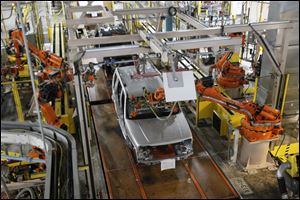
Automation focus of annual BGSU State of the Region summit
4/16/2018
Robots install windows at the Toledo Jeep Assembly Complex Many fear the robots will displace human workers..
Think the coming wave of artificial intelligence and automated robotic systems is overhyped?
Think again.
“The robotics revolution is every bit as big as you are led to believe,” said Eric Daimler, an artificial-intelligence expert and the keynote speaker at Bowling Green State University’s State of the Region program.
From self-driving cars and forklifts to self-aware office assistants and industrial robots, the decade and beyond is going to bring massive change to the U.S. economy.
“The reality is really we’re going to most likely work alongside robots, giving us augmented skills. That’s what history suggests, that’s what the best thinking of today says, that’s where we should be thinking in this discussion today,” Mr. Daimler said. “And the future belongs to both those companies and those workers who want to harness the power of robots without overly fearing the potential negative implications, scary though they may be.”
Mr. Daimler is chief executive officer of Pittsburgh-based SpinGlass, an investment platform that specializes in the development and adoption of robotics, artificial intelligence. He also has taught at Carnegie Mellon’s School of Computer Science and served as a Presidential Innovation Fellow in the Obama administration.
But while Mr. Daimler argues AI and robotics are going to bring massive disruption, he rejects the more intoxicating narratives that robots are going to create some sort of utopia — or, perhaps, dystopia — where human work is fully supplanted by machines.
Instead, jobs will spring up.
“Historically every new wave of technology displaced an old one, but it brought a new wave of satellite industries as well. New jobs, new ways of collaboration to take advantage of these tools,” he said.
Bowling Green’s Center for Regional Development has been hosting its annual State of the Region summit for nearly a decade.
At this year’s meeting, which was held Monday in Perrysburg, attendees got an overview of the local, state, and nationwide economic outlook from Guhan Venkatu, the Federal Reserve Bank of Cleveland's group vice president for regional analysis and outreach.
Broadly, Mr. Venkatu said most economic indicators continue to look positive for growth both in the United States and globally, even during the volatility in the equities market.
Mr. Venkatu also addressed trade policy issues, including the steel and aluminum tariffs recently put in place by Washington and the potential retaliatory actions from China on products such as Ohio-grown soybeans.
“While they’re certainly have important implications for the affected industries and individuals, the overall macroeconomic effects are likely to be small,” Mr. Venkatu said.
While soybeans are Ohio’s top agricultural export, Mr. Venkatu said the entire agricultural industry contributes only 0.6 percent of Ohio’s gross state product.
But the biggest theme for Monday’s program was the implications of automation.
On that, Mr. Venkatu noted that many people have a feeling that the changes of the present are unlike anything seen before. But history shows that’s not necessarily true.
“We’ve come through several significant technological shifts in the last 250 years and in each case the total number of jobs has actually increased,” he said.
That was true even of textile weavers — the original Luddites — who feared the industrial revolution and machinery would eliminate employment in their industry.
In some respects, Mr. Daimler said northwest Ohio’s economic future is dependent on how it reacts to the changes.
“This region absolutely has a lot at stake. You might say it has everything at stake,” he said. “As a traditional manufacturing powerhouse, western Ohio has as much to gain or lose as any region in the country, so you need to think big — as a region, as part of the national and global economy.”
The keys to success, he said, are largely based on connections. That includes building partnerships and collabrating with other tech-heavy regions, ensuring that there’s cooperation between business, government, and labor, and recognizing that education can’t end at 18 or 22.
Students, he said, need to be taught not just skills, but the skill of learning, as a way to hedge against more shifts in the economy.
Contact Tyrel Linkhorn at tlinkhorn@theblade.com, 419-724-6134, or on Twitter @TyrelLinkhorn.